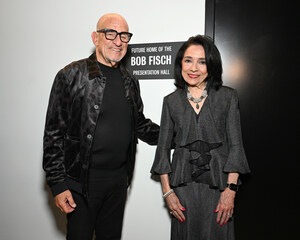
Advanced Business Models Define Future Innovation Strategies
Squadsourcing … Trust Currency … Time Design
FIT's Cosmetics and Fragrance Marketing and Management Master's Program in Partnership with LVMH Perfumes & Cosmetics, North America Predicts The Future of Innovation: Global Insights, New Business Models, and Recommendations
NEW YORK, June 14, 2016 /PRNewswire-USNewswire/ -- Today, innovation goes far beyond research labs and Silicon Valley pitch meetings. Given the breakneck speed of change in the business climate, fueled by the constant evolution of technology, corporations have an imperative to innovate or perish.
Emerging beauty industry executives in the Fashion Institute of Technology's (FIT) Cosmetics and Fragrance Marketing and Management (CFMM) Master of Professional Studies program presented global qualitative and field research on June 8, examining "The Future of Innovation." The research focused on infusing external points of view, as well as creating "best practice" models for internal corporate innovation culture. The research benchmarked ten industries, including technology, automotive, fashion, retail, and academia, across the U.S., China, South Korea, and Japan. Eighty qualitative interviews with global experts informed the work, with viewpoints from a diverse group of companies such as 3M, Google, and L'Oréal.
Key Insights:
- The Burden of Knowledge: Innovation can be stifled by an endless stream of data and ideas.
- Fast Is Too Slow: It is projected that 40 percent of current Fortune 500 companies will be out of business by 2025 (Iannou, 2014).
- Man vs. Machine: In 30 years, 50 percent of the workforce may well be a form of artificial intelligence (AI).
- The Linked Generation: Gen Z is reframed as "The Linked Generation." Entrepreneurial and independent, they reject bureaucracy and are driven by purposeful work.
Predictions:
- The "New American Truth" will replace the American Dream. Instead of linking their career paths to corporations, individuals will become their own self-made brands.
- The speed at which trust is earned and exhibited will play a critical role in reaching the goals of Gen Z, who expect to have started a business by the time they graduate college and spend fewer than three years at their first job.
- Education will become modular and tied to professional skill development.
- The democratization of innovation will continue to influence business. The expansion of platforms such as Fab Labs, Etsy, and YouTube provide unprecedented access to innovative tools.
- A trust economy and trust culture will replace our current sharing economy, which has virtually eliminated the need to own even the most basic possessions (e.g. cars and clothes).
- By 2020, 40 percent of the workforce will consist of "omni employees," who work on a freelance basis (Intuit, 2010), most likely in an app-driven environment.
Recommendations
#1 The Innovation Ecosystem: A New Business Methodology. Comprising six key, interdependent components—the government, the non-governmental organization, the city, the academy, the corporation, and the individual—the innovation ecosystem is a new model for a global, interdependent innovation culture that mitigates risk, promotes curiosity, and uncovers groundbreaking ideas through collaborative partnerships.
- The New IP: Innovation Partnerships. To succeed, corporations will need to evolve the existing IP—intellectual property—mindset focused on ownership of ideas. The new model relies on a more collaborative system of innovation partnerships, termed "the new IP."
- Crowdsourcing will evolve into "squadsourcing." Rather than relying on a generic crowd, squadsourcing will identify trusted and valued external partners to source a solution. This will be Gen Z's version of a brain trust.
#2 The Innovation Blueprint: A New Corporate Innovation Model. This new model shifts focus from employee output to external partner input and delivers an incremental 18 percent ROI over seven years, based on three key components:
- Fluid Organization: An adaptive and dynamic organizational structure meant to disrupt the rigid business models currently in place in order to bring in diverse perspectives. Projects are staffed with a variety of talents based on skills and expertise rather than job title, in order to harness a wide range of thought and backgrounds.
- Time Design: An experiential concept that shifts the focus of corporate organizations from the traditional model of employee output to a more collaborative structure of input from external partners. Time design redefines how employees drive their careers and projects, and promotes broadening employee perspectives in order to foster innovation.
- Trust Culture: A dynamic corporate environment rooted in psychological safety and the exchange of perspectives. Reportedly, increasing trust within a corporate structure by 10 percent has the same impact as giving employees a 36 percent increase in pay (Helliwell & Haifang, 2008).
Video of the event, white papers, and infographics of The Future of Innovation research are posted for public view at fitnyc.edu/cfmm.
Contact:
Cheri Fein/FIT
212 217.4718
[email protected]
Christy McCuaig/LVMH
917 769.1690
[email protected]
SOURCE Fashion Institute of Technology







Share this article